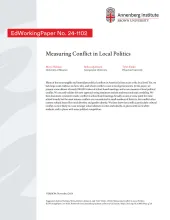The Trusted Source for Emerging Education Research
Researchers and policymakers can both benefit from timely access to research. EdWorkingPapers is a platform for prompt and open dissemination of high-quality studies. By connecting researchers and informing policymakers, the series accelerates progress in education.
Learn more about the platform →
Submit a paper
Have a paper you wish to post? Check out the EdWorkingPapers' scope and FAQs, and then submit your manuscript.





